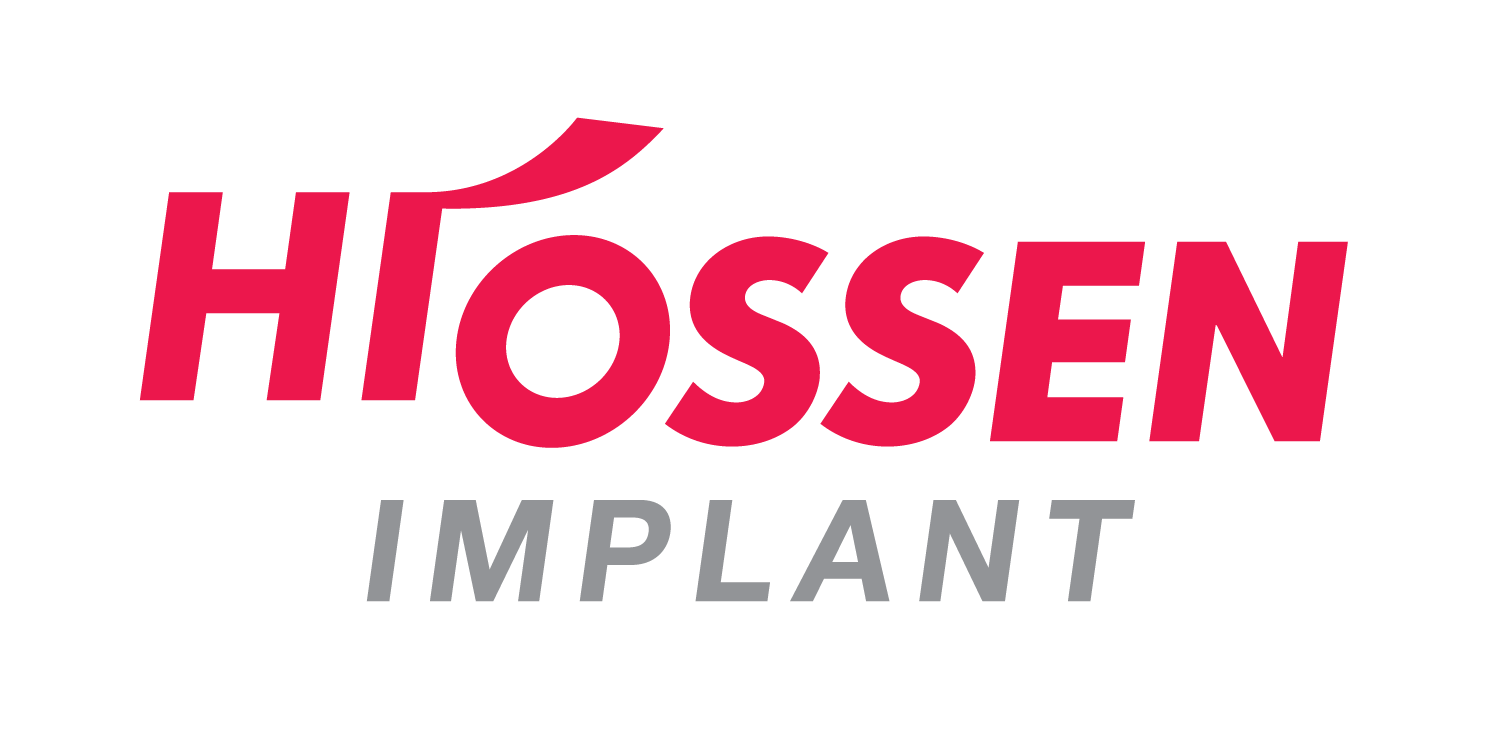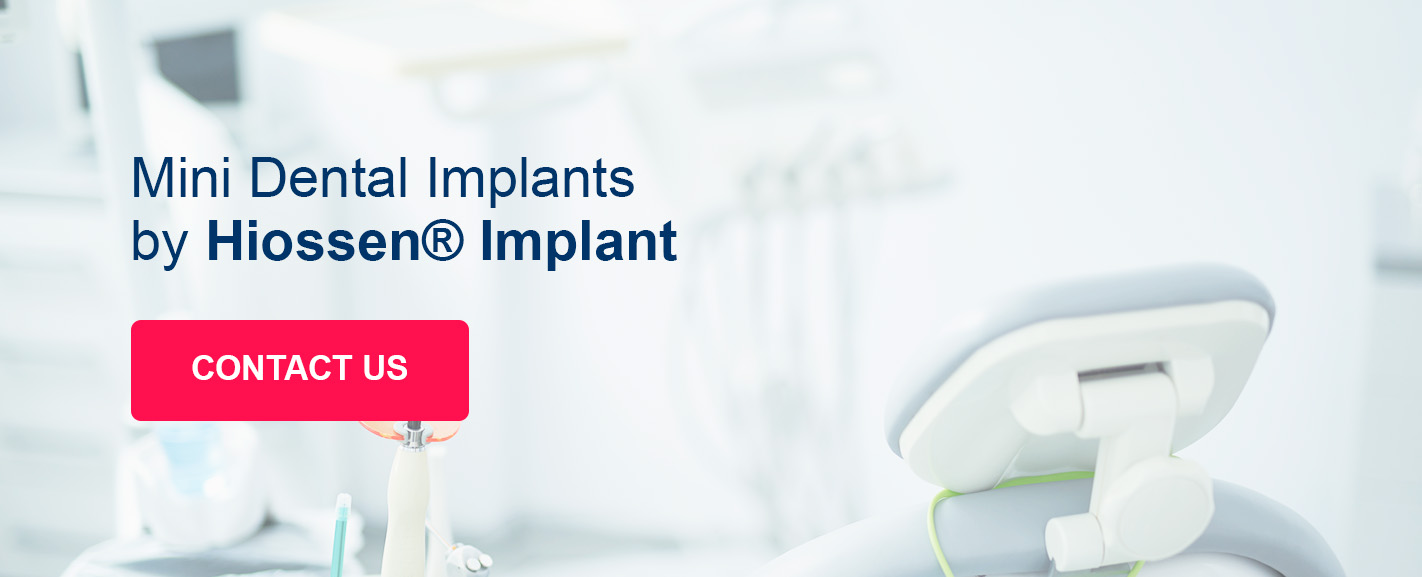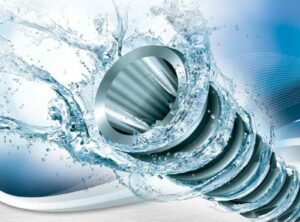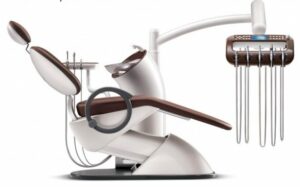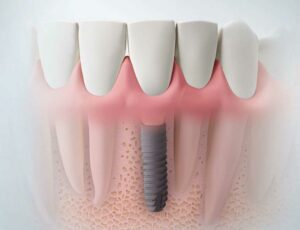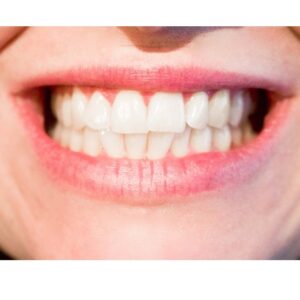If you’re insecure about your smile or are missing some teeth that make you self-conscious about your appearance, you’re not alone. One in four American adults avoids smiling due to the condition of their teeth and mouth, and one in five experiences anxiety because of what their teeth look like.
It doesn’t have to be this way! You can eat, speak and smile again with mini dental implants.
What Are Mini Dental Implants?
If you’ve never heard of mini dental implants, you’re not alone there, either. Mini implants are a dental implant system designed to be less involved and less invasive for people with conditions that preclude the use of full-sized implants. To understand what mini implants are and how they’re different, you should know how traditional dental implants work.
Unlike bridges and dentures, implants offer a permanent solution for people who are missing one or more teeth. First, your dental surgeon will insert screws into your jawbone over a series of visits, usually while you are under local anesthesia. Later, after your jaw has healed and the bone has fused to the screws, a dental professional will attach replacement teeth to the titanium posts.
If this process sounds invasive and potentially painful, that’s because it is — at least, until implants heal, which can take a few months. For many people, having artificial teeth that look, feel and work like the genuine article is worth the temporary discomfort. After all, you can brush them just like natural teeth, and you never have to worry about forgetting where you left your implants. Dental implants range from a single tooth to replace the one you lost to full sets or implant-supported bridges.
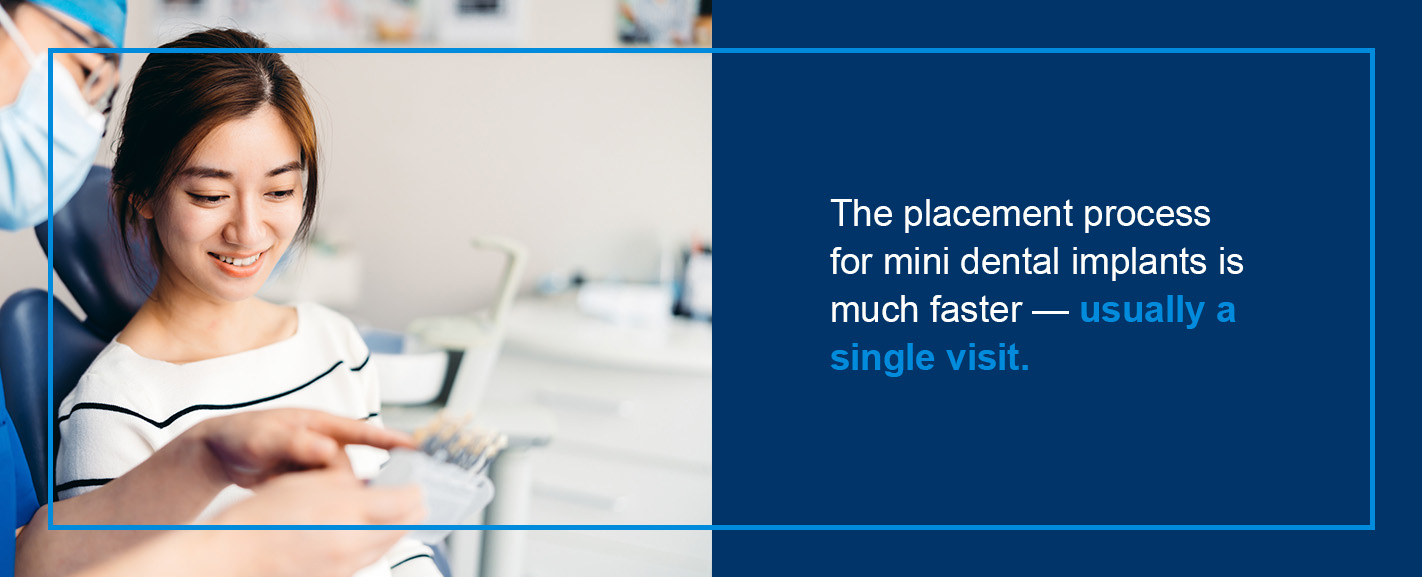
Advantages to Mini Dental Implants
What if you could gain all the advantages of dental implants without the pain, multiple procedures and lengthy healing time? Mini dental implants are very similar to their larger, more invasive counterparts, but they offer a long list of benefits traditional dental implants can’t. For example:
- As their name suggests, mini dental implants are much smaller. Instead of the typical size of 3.25 to 5 mm, they are usually 3 mm or less.
- Mini dental implants consist of one single piece with a small ball that protrudes from the jaw.
- Mini dental implants are less invasive. A dental professional will insert the toothpick-sized implants into the jawbone through the gum surface.
- The placement process for mini dental implants is much faster — usually a single visit.
- There are no sutures required.
- Because the process for placing mini dental implants is so much less involved, they require a shorter recovery time.
- Mini dental implants are viable for more people — some people do not have enough jawbone to screw traditional dental implants into, but with mini dental implants, that’s not a problem.
- Mini dental implants are usually much less expensive — costs vary, but on average, mini dental implants range from about $500 to about $1,500, while traditional implants fall somewhere in the $1,500 to $6,000 range.
- Mini dental implants can be less risky than traditional implants. If your jawbone has deteriorated, it might not have the stability to hold traditional implants, and in patients with weak jawbones, conventional implants can even cause a fracture. While you should always seek a dental professional’s opinion, in most cases, even thin bones can support the smaller size of mini implants.
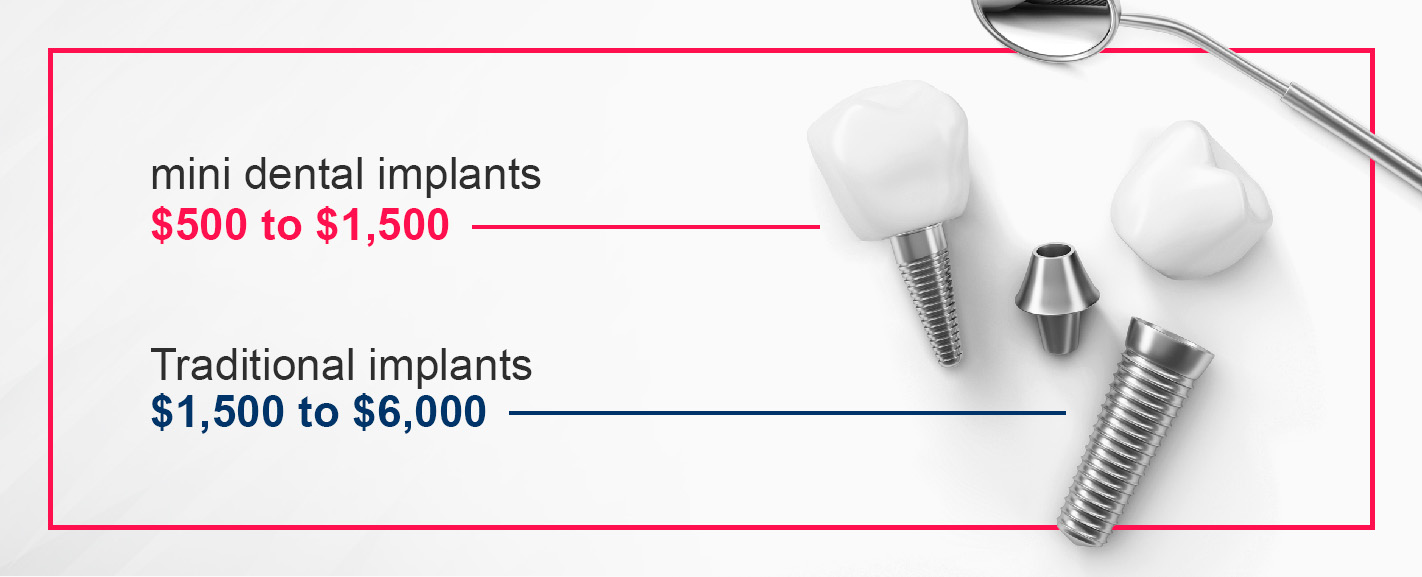
Are Mini Dental Implants as Good as “Regular” Dental Implants?
Mini dental implants are a relatively recent innovation, and while they offer patients many advantages, there hasn’t been much time to study their durability and longevity. They might not be quite as durable or long-lasting as their larger traditional forebears, but most experts can confidently say that mini dental implants should serve you well for several years.
Some professionals advise that traditional implants may be a bit sturdier if you have the jawbone to support them. However, even people without bone deterioration often don’t have the time or the inclination to attend several office visits and take several months to heal. Many others don’t want to undergo such a complex and painful process, and there’s no shame in that! For these people and many others, mini dental implants are a choice well worth discussing with your dental professional.
What Is the Success Rate of Mini Dental Implants?
The success rate for mini dental implants is generally excellent. One retrospective analysis of 5,640 implants placed over a 12-year period found mini dental implants had a 92.1% success rate. Additionally, implants supporting fixed prosthetics demonstrated a 94.7% success rate, compared to removable prosthetics, with an 88.4% success rate.

Mini implants placed in the lower jaw also had a slightly higher success rate than those placed in the upper jaw, likely due to differences in bone quality and density. Implant recipients’ age, general health and post-surgical implant care also played a role in these devices’ longevity.
How Long Do Mini Dental Implants Last?
With proper care, mini dental implants can last for many years. Again, mini implants are a more recent innovation than traditional implants, so dentists and researchers haven’t had quite as long to study them. However, as the data above shows, thousands of patients have happily had their mini dental implants for a decade or more.
However, everyone’s body — mouth included — is different and will have variables to consider. Some factors that can affect your mini dental implants’ longevity are:
- The condition of your jaw and whether there’s further deterioration, as seen with osteoporosis or other diseases
- Your overall well-being and whether you’re leading a healthy lifestyle
- How well you care for your mini dental implants in the years following the procedure
Barring any unforeseen circumstances, a healthy adult can expect their mini dental implants to last a long time, and that’s another reason to smile.
Can Mini Implants Fail?
No medical or dental procedure is foolproof, and when dealing with the human body, there are too many variables to guarantee a 100% success rate. However, at an average 95% success rate, mini dental implants are highly reliable. When they fail, an extraneous circumstance is often to blame.
Of course, you’ll need to discuss your unique circumstances, including any risk factors, with your oral surgeon or dental professional. Only they can give you an accurate and honest assessment of your chances for success. What factors can influence mini dental implants’ success rate, aside from the ones listed above?
1. Poor Bone Density
It’s rare, but some patients’ jaws are too thin for mini dental implants. Even with their much thinner posts, the mini implants must be firmly embedded in the bone. Conditions like osteoporosis can lead to bone deterioration that makes mini dental implants ill-advised. As this is a case-by-case situation, your dentist will need to make the final determination following an exam and possibly X-rays.
2. Gum Disease
Periodontal disease isn’t always something you can see or feel. Mini dental implants require healthy gums, but some patients develop gum disease without realizing it. If left untreated, gum disease can cause mini dental implants to fail. The best way to avoid this is to get regular dental checkups, which everyone should do regardless!
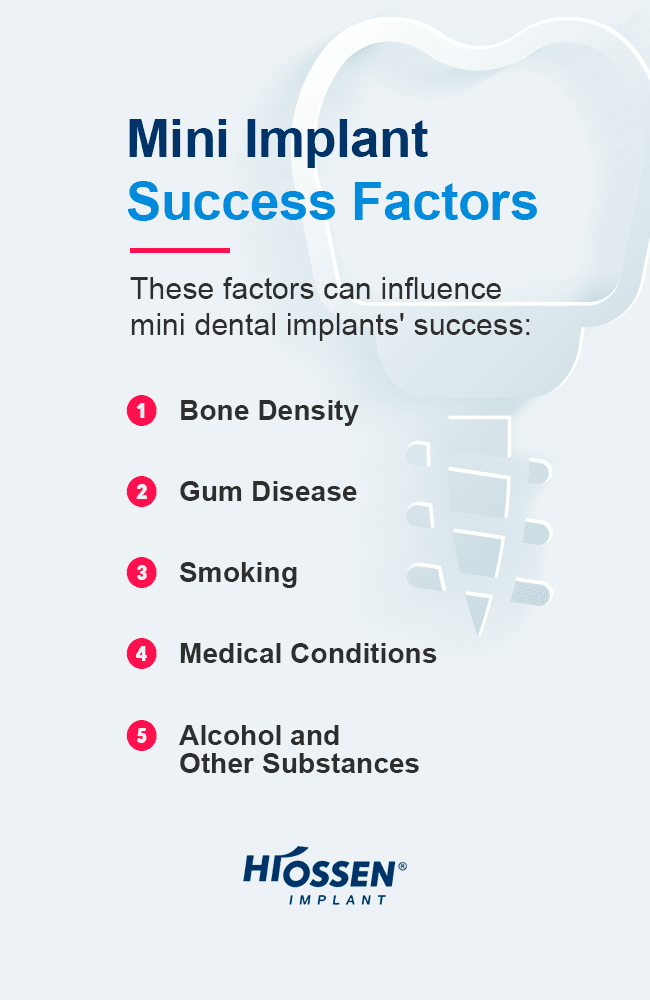
3. Smoking
Smoking after undergoing a medical procedure slows the healing process and leaves people more vulnerable to infection. Heavy smokers with mini dental implants can see much higher failure rates than their non-smoking counterparts. If you have mini dental implants or are thinking about getting them, now is the time to kick the habit. Smoking is so damaging to dental implants and overall health that most professionals won’t consider performing the procedure until you have been a non-smoker for at least two months.
4. Medical Conditions
Some conditions like rheumatoid arthritis or diabetes can impede the healing process enough that mini dental implants fail. Be sure to inform your dental professional if you have these or any other health issues.
5. Alcohol and Other Substances
Much like smoking, frequent use or abuse of alcohol and other drugs can shorten your mini dental implants’ lifespan or cause them to fail. Unfortunately, some substance use disorders can even lead to further bone loss or other physiological conditions that make it impossible to replace the implants after failure. If you are struggling to quit alcohol or another substance, it’s best to be honest and discuss your situation with your general practitioner or dentist before the procedure.
Are You a Candidate for Mini Dental Implants?
Mini dental implants are an excellent choice for most people interested in replacing one or more lost teeth. Some patients who will benefit most from mini dental implants include the following.
- Long-term denture users: Years of wearing dentures can lead to bone deterioration, making traditional implants impractical.
- Those who want a fast recovery: Not everyone can afford to take a long time away from work or other obligations. The healing process for mini dental implants usually only takes a couple of days.
- People who are interested in saving money: Mini implant placement requires fewer appointments and follow-up visits than traditional implants, helping you save money and time.
- Non-smokers in excellent overall health: Ideal mini implant candidates are otherwise healthy and don’t suffer from conditions like diabetes that can impede the process.
You will need to talk to your dentist to be sure, but if you can check these boxes, there’s an excellent possibility mini dental implants can restore your lost teeth and your confidence.
What Does the Mini Dental Implant Procedure Look Like?
If you’re leaning toward getting mini dental implants to replace a lost tooth or several teeth, you might wonder what this procedure entails. While there are slight variations among professionals and their patients, the process will typically follow steps like these.
- Your dentist will take a series of detailed X-rays before the procedure to determine the best placement for your mini implant. This essential step reduces the chance of implant failure.
- Your dentist will give you a local anesthetic to numb the area where you will have your titanium implants installed. As a result, you shouldn’t expect to feel any pain during the implant process. However, the medication does not remove the sensation of pressure, so you’ll be able to feel the dentist putting the mini implant in place and possibly some pushing or pulling against your jaw. Since you’ll remain conscious, you can always alert the dentist if you feel the numbness wearing off.
- Having determined the ideal placement for your mini implant, the dentist will make a small hole in your gum tissue with a pilot drill. Then, they will insert the titanium post into your jaw and attach the tooth prosthetic with a ball-and-socket joint and an O-ring that snaps it firmly into place on the post. Unlike traditional implants, with mini dental implants, the dentist often adds the artificial tooth in the same appointment, so you leave the office with any missing teeth fully replaced.
- Soon after the replacement tooth is in place, you will be ready to leave the office. You may receive a prescription for pain medication, though for most people who get mini dental implants, over-the-counter pain medications are sufficient for managing any discomfort they feel.
How Long Does It Take to Heal From a Mini Dental Implant?
Healing is an individual process, dependent on many factors like age, overall health and even diet. In general, healing from mini dental implants happens in two stages.
- During the first stage, the gums will heal around the implant — something you can see and feel happening. For an average, healthy adult, this process generally takes between two and five days.
- In the next stage of the recovery process, the jawbone fuses with the mini dental implant. You won’t see or feel this happening, though your dental professional will monitor the healing process. In an average healthy adult, the second stage takes around three months to complete.
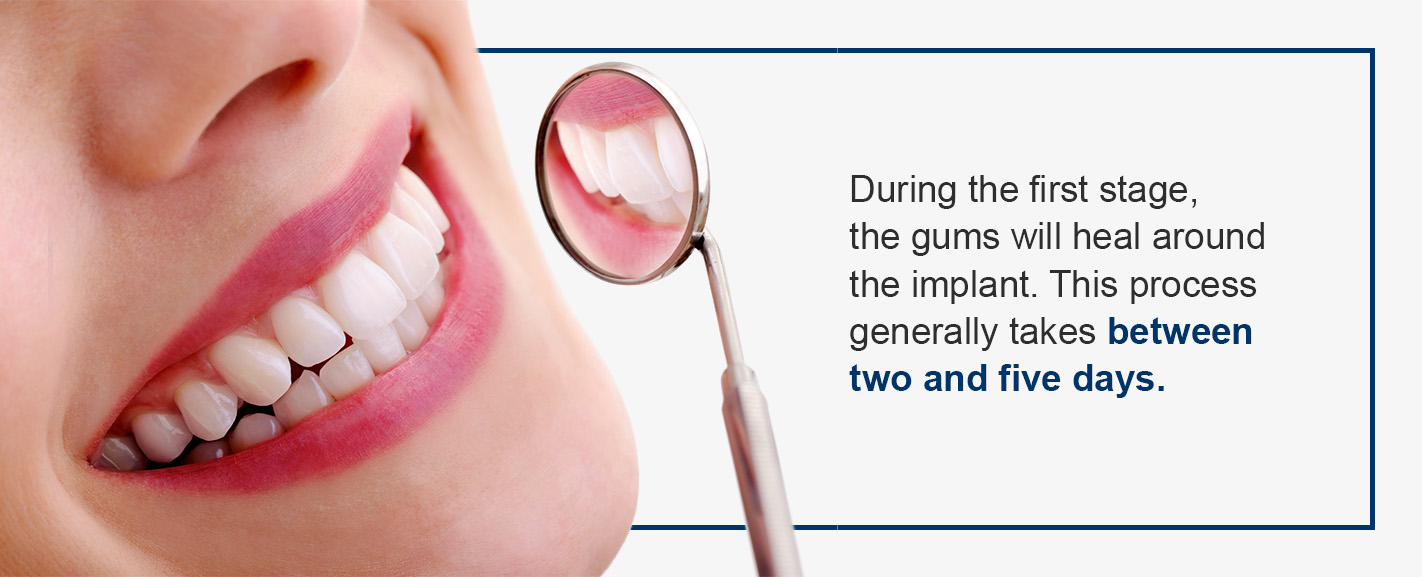
How Painful Is the Mini Dental Implant Process?
You should not feel any pain during the process itself. Afterward, some tenderness and swelling are normal, but many people can manage this minor discomfort by taking non-prescription pain medication. In the initial days following your procedure, you may want to avoid foods that are hard, chewy, sticky or excessively hot or cold. Within a few days, most of the discomfort will likely have passed, and you will be well on your way to enjoying the confidence that comes with your shiny new smile.
Mini Dental Implant Care and Maintenance
In many cases, ease of care is the primary appeal of mini dental implants. However, you can follow a few straightforward tips to keep them in excellent condition while you look after your oral health.
Directly Following the Procedure
When you leave the office after having your mini dental implants inserted, the first thing you’ll want to do is rest and take it easy. You will also want to follow the advice about sticking to softer, gentler foods for a few days following the procedure.
Your mouth might be a little bit tender in the few days to a week following the procedure, but if you experience excessive bleeding, swelling or pain beyond what your meds can alleviate, you should contact your dentist right away, as these could be signs of a severe — if rare — potential complication. Though the healing process will continue below the surface, you will be back to enjoying all your favorite foods and showing off your new smile within a week or so.
Long-Term Care for Mini Dental Implants
The beauty of mini dental implants is that they’re no different from your natural teeth in terms of appearance or care. With mini dental implants, you should continue brushing and flossing regularly, and visit your dentist for checkups.
Depending on your mini dental implants’ configuration, you might have to get used to taking the tooth or bridge out to clean it periodically. This process is quick and simple, and will only add a few minutes to your typical daily hygiene routine. All you will need to do is:
- Gently remove the tooth or bridge — your dentist or dental professional will explain and demonstrate this simple, painless step.
- Use a cotton swab and some toothpaste to clean the tooth or bridge.
- Use a small denture brush to gently clean the empty space.
- Rinse with mouthwash.
- Replace the tooth or bridge.
- That’s it! Get out there and smile!
Mini Dental Implants by Hiossen® Implant
At Hiossen, we specifically designed our MS Dental Implant System to have a high success rate and simple insertion, even in the narrowest spaces. Our MS System’s small, single dental implants have an ideal size and shape resulting from years of extensive research. They have achieved flawless insertion and optimal bone penetration, with industry-leading strength, stability and durability.
When creating the MS System, our priority was to bring people a better smile and more confidence. We also wanted to provide dental professionals with the means to offer their patients a cost-effective, minimally invasive and superior-quality option.
You can learn more about the Hiossen MS System by viewing our mini implant PDF here. You can also learn more about the different types of implants or other equipment and materials.
If you still have questions, our dedicated team is always happy to help. Contact us today.
